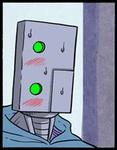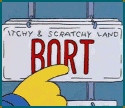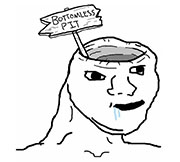|
The way I play it, it's a bit more like Hitman.
|
|
|
|

|
| # ? Apr 20, 2024 01:33 |
|
A friend asked me what CK2 was and I told them it was a Princess Breeding Game, or medieval eugenics.
|
|
|
|
Baronjutter posted:A friend asked me what CK2 was and I told them it was a Princess Breeding Game, or medieval eugenics. Princess Maker 2 was the pinnacle of medieval politics sims. Get on it, Paradox.
|
|
|
|
Demiurge4 posted:Princess Maker 2 was the pinnacle of medieval politics sims. Get on it, Paradox. https://steamcommunity.com/sharedfiles/filedetails/?id=511390130
|
|
|
|
Of course that is a thing.
|
|
|
|
Demiurge4 posted:Yeah I get you. I don't mind specialization but absolute percentage bonuses to an entire planets tiles builds into overspecialization because if every tile gets 20% (with a lab) and every lab gives adjacent ones even more tech, there's very little reason to build anything else. It also skews balance because one civ might find a ridiculous science planet and while the AI might develop it in a balanced way the player can overspecialize it and leap light years ahead in tech in just 20 turns. I do want production planets that have super productive factories but I want to decide whether building another factory in this tile is better than another city or lab because it'll give a significant boost to the planet. I think you're assuming that stuff like Labs give you a flat increase to research, which might not be the case. Because yeah if labs are just +5 Research then it's how you say. But if they're just +50% to Tile, then it doesn't really benefit you to build a lab on a tile that doesn't have any Research already except for an adjacency bonus. So there's no point in filling up a planet with Labs just because the planet gets a +% bonus to Research, because most of those tiles couldn't generate research anyway. I would also assume research will be Time Ahead capped like EU4 or CK2, you've got to pay dramatically more if you're starting to get well ahead of the curve. They've talked about having anti-snowball mechanics like this so I would be very surprised if research didn't work something like this.
|
|
|
|
Fintilgin posted:It really depends on how its executed in game. If it's like MOO2, where every turn is a dozen planets demanding you update their build queue, that would be bad. If it's like EUIV, where you've five hundred provinces with ~5 building slots apiece, but you're really just going in and enhancing certain places when you've got the extra resources, that's probably fine. This absolutely. It's the main reason I prefer MoO over its sequel and why I'm not a fan of GalCiv. I trust Paradox to handle it well, but I'm nervous about any similar mechanic.
|
|
|
|
Gwyrgyn Blood posted:I think you're assuming that stuff like Labs give you a flat increase to research, which might not be the case. Because yeah if labs are just +5 Research then it's how you say. But if they're just +50% to Tile, then it doesn't really benefit you to build a lab on a tile that doesn't have any Research already except for an adjacency bonus. So there's no point in filling up a planet with Labs just because the planet gets a +% bonus to Research, because most of those tiles couldn't generate research anyway. Yeah it's really hard to make hard judgements off a screenshot but I assume the city (is it a city?) gives +1 mineral and maybe +2 food for the tile, bringing it to 2m, 3f. Then each adjacent farm gives it +2f each giving it 7 food. The other tiles probably don't have any base production so I assume the farm is +3f and the adjacency another +2f to give them the total of 5. If I'm right this would mean numerical production outputs for a building and not a percentage bonus. If you cleared the tile to the left of the city and build a lab that gives +3 science that would bring the tile to 7 with the adjacency bonus and another +1.85 (maybe rounded to 2) from the global bonus to society tech but I assume that is added to the total output of the planet and not per tile. Chaining labs all around would therefore give you 3 to 11 science per tile, of course not accounting for mandatory farms for food. The 25% bonus to tech objectively becomes more powerful the more science you produce on the planet, which encourages overspecialization.
|
|
|
|
Westminster System posted:I had fun with Stardrive 2 - people are extremely salty over the fact that Stardrive 1 was never "finished" (Part developer fault, part random factors, part game engine being discontinued during development) - though its still a reasonably decent game let down by engine limitations. Mileage varies on the bias of other reviews as well.
|
|
|
|
Demiurge4 posted:Chaining labs all around would therefore give you 3 to 11 science per tile, of course not accounting for mandatory farms for food. The 25% bonus to tech objectively becomes more powerful the more science you produce on the planet, which encourages overspecialization. Yeah, if it's a flat bonus then definitely. Farms would make sense to be a flat + bonus to production, which is fine because Food is not an exportable resource and required for the planet to develop at all. But maybe the other ones aren't? Minerals wouldn't make sense to be a flat bonus, if you build a mine where there isn't any resources there doesn't magically become some. You could run with the same concept for Research (studying weird things found at the tile) and Power (represents having natural resources specific to generating power on those tiles). I dunno, guess we'll see.
|
|
|
|
hi i would like to say i think stellaris looks cool. that is all.
|
|
|
|
To continue the tilerant, I have no real gameplay objection beyond planets not actually being a square or a rectangle, and representing them as though they are looks silly. I always liked Ascendancy's system of isometric tiles, which while a micromanagement pain in the end game always had the decency to look like you were doing something to an actual planet.
|
|
|
|
I have no strong feelings one way or the other about Stellaris
|
|
|
|
Wiz generally has Cool Opinions. If he says the system works fine I'll trust that it's not an issue
|
|
|
|
Gwyrgyn Blood posted:Yeah, if it's a flat bonus then definitely. Farms would make sense to be a flat + bonus to production, which is fine because Food is not an exportable resource and required for the planet to develop at all. But maybe the other ones aren't? Minerals wouldn't make sense to be a flat bonus, if you build a mine where there isn't any resources there doesn't magically become some. You could run with the same concept for Research (studying weird things found at the tile) and Power (represents having natural resources specific to generating power on those tiles). I dunno, guess we'll see.
|
|
|
|
Gwyrgyn Blood posted:Yeah, if it's a flat bonus then definitely. Farms would make sense to be a flat + bonus to production, which is fine because Food is not an exportable resource and required for the planet to develop at all. But maybe the other ones aren't? Minerals wouldn't make sense to be a flat bonus, if you build a mine where there isn't any resources there doesn't magically become some. You could run with the same concept for Research (studying weird things found at the tile) and Power (represents having natural resources specific to generating power on those tiles). I dunno, guess we'll see. It's killing me that we don't have more information because you make a great point in that regard. Food isn't exportable so it does make sense it's flat bonuses. Other resources are more powerful and could conceivably be static and only improvable on that tile alone but we don't know without more information. Maybe a Paradox dev can do a driveby and answer that question. It's still also unanswered if planet tiles actually stay in the game when you graduate. Paradox have been vague on that point but I suspect that planet tiles may just be a temporary mini-game to give the player something to do in the early game until he becomes an empire and you start juggling systems instead of planets.
|
|
|
|
Westminster System posted:I had fun with Stardrive 2 - people are extremely salty over the fact that Stardrive 1 was never "finished" (Part developer fault, part random factors, part game engine being discontinued during development) - though its still a reasonably decent game let down by engine limitations. Mileage varies on the bias of other reviews as well. The 3ma crew reckoned the sequel stripped out everything interesting about the original and ended up being a much more conservative MoO-like. Confirm/deny?
|
|
|
|
I can't agree entirely with the former, but MoO-Like is used for literally any turn based strategy set in space these days so whether that matters is another. That said I haven't played it in a good while so who knows.
|
|
|
|
Autonomous Monster posted:The 3ma crew reckoned the sequel stripped out everything interesting about the original and ended up being a much more conservative MoO-like. Confirm/deny? Pretty much. SD2 is basically a remake of MoO2.
|
|
|
|
It's interesting that for all that MoO1/2 are held up as the gold standard of space 4xes that everyone should copy, I don't remember many games if any at all that tried to replicate their tech system with the hard choices that came along with them.
|
|
|
|
Darkrenown posted:Pretty much. SD2 is basically a remake of MoO2. I saw they announced new dlc for the game which implements sectors and makes the galaxy 4 times larger. That's... Basically the graduation mechanic where you move up to managing an empire rather than planets. For all the poo poo I give the SD2 dev he did make a pretty decent game that is very faithful to Moo2.
|
|
|
|
Had not seen that, sounds interesting. But the SD galaxy is only 100 stars, making it 4 times larger is still on the small side for a 4x. Tomn posted:It's interesting that for all that MoO1/2 are held up as the gold standard of space 4xes that everyone should copy, I don't remember many games if any at all that tried to replicate their tech system with the hard choices that came along with them. SD2 has the same system, as does the upcoming Lord of Rigel. I almost always played Creative races in Mo0 though, gotta have all the tech!
|
|
|
|
Creative was broken as gently caress and a Bad mechanic I'll admit that the other OP strategy of stacking pop growth with food and subterranean was a lot of tedious micro though and creative was more appealing if you just wanted to gently caress around.
|
|
|
|
Demiurge4 posted:Yeah it's really hard to make hard judgements off a screenshot but I assume the city (is it a city?) gives +1 mineral and maybe +2 food for the tile, bringing it to 2m, 3f. Then each adjacent farm gives it +2f each giving it 7 food. The other tiles probably don't have any base production so I assume the farm is +3f and the adjacency another +2f to give them the total of 5. If I'm right this would mean numerical production outputs for a building and not a percentage bonus. If you cleared the tile to the left of the city and build a lab that gives +3 science that would bring the tile to 7 with the adjacency bonus and another +1.85 (maybe rounded to 2) from the global bonus to society tech but I assume that is added to the total output of the planet and not per tile. Pretty much any system kinda based on that civ-ish model is going to encourage specialization- I don't think it needs further encouragement. Civ4 encouraged specialized cities, but not as blatantly as GalCiv3. Basically, it was sub-optimal to build all the buildings in all the cities, wasting your hammers, but it was more of a gentle nudge to specialization, not "scout ships with 20+ tile sight ranges and planets that are nothing but a farm and 20 factories". The slider system contributed to GalCiv3's tendency toward overspecialization since you got nowhere near as much benefit from all these buildings if you weren't maxing out one thing.
|
|
|
Tomn posted:It really depends on what kind of player you are. The developers are huge fans of statistics, to the point where I think they rely on statistics to carry the narrative of the game, as it were - there's a lot of emergent narratives that come out of the gameplay, but you can only tell that it's there if you learn how to parse the absolute shitload of numbers they throw at you from every angle. Without that knowledge (or the patience to gain that knowledge) the game's a giant, overwhelming infodump that doesn't feel much like anything at all. I wasn't a fan myself, but if you're into that it could scratch your itch. I think that is an issue many space 4Xs have, and why I've never manage to have on click for me like CK2 or EU4. While in EU4 I can think about my nation as a entity wanting to increase its power, and see how that achieved, in many space games I don't see a need to expand, especially when the galaxy is small enough only 4 or 5 nations exist. Start ruler helped a bit - I went to war with other nations so I could get the planets to get the resources to upgrade my planets, but I disliked the warfighting mechanics enough the game didn't really grab me. As others said, I hope to see more of a focus on the nation itself and development of my people, to give me reasons to crush my neighbours if I want.
|
|
|
|
|
Tomn posted:It's interesting that for all that MoO1/2 are held up as the gold standard of space 4xes that everyone should copy, I don't remember many games if any at all that tried to replicate their tech system with the hard choices that came along with them. I'm not so sure MOO2 encouraged all that many hard choices either. Most people seemed to take the same path through the tree every time. tooterfish fucked around with this message at 14:57 on Nov 18, 2015 |
|
|
tooterfish posted:MOO1's tech system was semi-randomised, it worked completely differently than MOO2's. One time I took Power Armor instead of automated factories by accident and won the game by boarding (neither of us used shields).
|
|
|
|
|
I loved both moo and moo2 and no one, not a single "clone" has actually captured any of the best mechanics. What I loved about the original Master of Orion is that it was simple but had depth. I really liked the industrial system. A planet has population and an industry score. Each base unit of population gave some tiny amount of production, plus each unit of population is able to staff a certain number of factories. Factories give a large amount of production. As you go up in computer technology you get better and better robotics, allowing you to build more factories per population. As you go up in construction tech it makes your factories cheaper to build, allowing you to grow quicker. There is also a pollution mechanic which makes increased production have diminishing returns due to more and more production needing to be put towards keeping the planet clean and livable, and of course then technologies that reduce pollution in some way. So as you go through the game your empire slowly gets more productive, not in huge leaps but fairly gradually as you go from robotics II to robotic III or what ever. None of it requires your intervention. Planets automatically direct most of their production towards building more factories until they hit a cap, and when a new tech comes along they automatically build to that new cap. When you get better pollution tech your planets automatically build it and then reduce their pollution budgets. The interface and automation isn't perfect but it some how managed to be better than nearly every game that followed. No micro-managing tiles or buildings, no worrying about optimizing or specializing. That mineral ultra rich planet you probably want to "specialize" for industry but it's simply a matter of pulling that production slider up to maximum. That mineral poor artifact planet? Drag it's research to maximum. Done. No pre-planning, no building placement mini-game. I think the ideal planet management system would be something like this, just a few stats, and maybe the ability to build the odd specialty building here or there but never at moo2 or civ levels of buildings. Keep it simple and abstracted, no building placement mini-game, but provide a rich amount of interesting statistics showing the mechanics behind each planet.
|
|
|
|
Stellaris with Victoria 2 style factory slots for each planet 
|
|
|
|
Alchenar posted:Have you considered we're all grieving for the HOI4 beta? Speaking of, I didn't get in despite having something like three years of legit professional QA experience (I listed my experience ofc), what's their selection criteria? Disclaimer: Slightly salty.
|
|
|
|
Baronjutter posted:I loved both moo and moo2 and no one, not a single "clone" has actually captured any of the best mechanics. That obviously worked, but it sounds kinda dull when you're at the one or two planets stage. If Paradox can deliver, then an indepth managing of buildings and optimisation for your first half-dozen planets might be pretty cool. And then when you have more than that you switch to more of a MOO1 system.
|
|
|
|
Maybe I'm just not thinking about it right, but planetary management being disabled as you get larger sounds like it'll bother the hell out of me. Even when automation in games is practical and makes a lot of sense it still always feels like "well the AI doesn't know how to manage the planets as well as me, why should I hand over control". Especially if a big part of the early game is having nicely optimized planets, and suddenly when you get bigger you find their efficiency hits the toilet. It'll just seem really jarring. What other games have done automation like that that people can point to? I can't think of any and maybe in practice I'm wrong and it feels really different. Raenir Salazar posted:Speaking of, I didn't get in despite having something like three years of legit professional QA experience (I listed my experience ofc), what's their selection criteria? lol
|
|
|
|
nvm
Enjoy fucked around with this message at 22:32 on Nov 18, 2015 |
|
|
|
Koramei posted:lol I'm sad because I know I would do a good job. 
|
|
|
|
Koramei posted:
I think the one game that does automation well is... CK2 --- since it basically replaces manages something with interacting with a character.
|
|
|
|
Koramei posted:Maybe I'm just not thinking about it right, but planetary management being disabled as you get larger sounds like it'll bother the hell out of me. Even when automation in games is practical and makes a lot of sense it still always feels like "well the AI doesn't know how to manage the planets as well as me, why should I hand over control". Especially if a big part of the early game is having nicely optimized planets, and suddenly when you get bigger you find their efficiency hits the toilet. It'll just seem really jarring. I wouldn't have a problem with it. The old system of managing individual planets would be gone - it wouldn't be like the option to hand over planets to governors that other games have, where they make the same decisions you would make but pick bad options, it'd be more like ten of your Europa 4 provinces merged into one when you got big enough. You wouldn't be concerned with what's going on in Brittany any more - your decisions only affect France. You literally wouldn't see the interface for a single planet any more, and it would just be up to Paradox to make sure the sector produced at the same rate as a reasonably-managed set of ten planets. They could even put in a system where converting ten planets into a sector means you get greater production than the ten individual planets could produce on their own when managed perfectly, to represent economies of scale and ensure that nobody feels like they should avoid making sectors. I have no idea if Stellaris is going to use a system like this, but who knows, maybe it would work.
|
|
|
|
MOO 3 was originally supposed to be all top-down, heavy automation, grandest of the grand strategy level stuff being the only thing under the player's control. Then they scrapped every system and had to hurriedly redesign it from the ground up because the feedback was apparently so bad and the rest is history.
|
|
|
|
On the other hand, even Paradox games - which are generally better than most at including systems to make managing a large empire manageable - get to the point in the late game where you can't be bothered finishing them since it's a bit of a slog managing all these separate provinces effectively and the game's a foregone conclusion. MOO3's approach was to keep all those provinces separate and give you AIs to manage them. This was bad. With merging planets into systems into sectors you could keep the "province" count low, and bypass the need for AI governors as a result. Imagine a game of Europa where you're Russia and you control all of Asia, but it's still just ten provinces you need to manage. And then the warp demons come.
|
|
|
|
Gort posted:MOO3's approach was to keep all those provinces separate and give you AIs to manage them. This was bad. It sounded rather Crusader Kingsish actually since the little AIs were actually characters in the game with skills and personalities that you appointed and interacted with, IIRC. At least that was the original idea.
|
|
|
|

|
| # ? Apr 20, 2024 01:33 |
|
Koramei posted:Maybe I'm just not thinking about it right, but planetary management being disabled as you get larger sounds like it'll bother the hell out of me. Even when automation in games is practical and makes a lot of sense it still always feels like "well the AI doesn't know how to manage the planets as well as me, why should I hand over control". Especially if a big part of the early game is having nicely optimized planets, and suddenly when you get bigger you find their efficiency hits the toilet. It'll just seem really jarring.
|
|
|

































